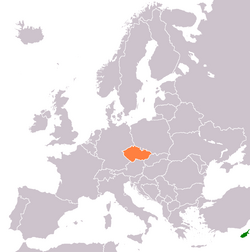This article relies largely or entirely on a single source .(August 2025) |
 | |
Cyprus | Czech Republic |
|---|---|
Cyprus-Czech Republic relations are the bilateral relations between Cyprus and the Czech Republic. Cyprus has an embassy in Prague. The Czech Republic has an embassy in Nicosia. Both countries are full members of the European Union and the Council of Europe. The two countries joined the European Union in 2004.

